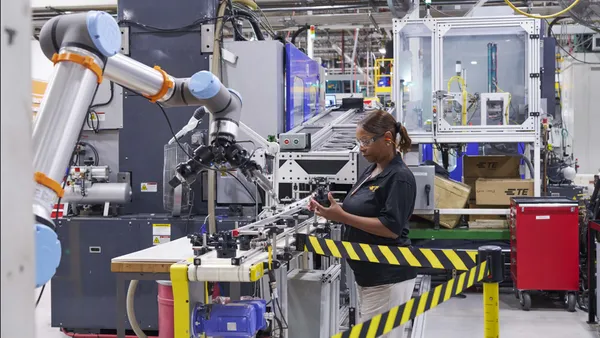Dive Brief:
- UPS will soon offer UPS Returns Manager, a free online tool for e-commerce merchants wishing to customize return shipments, according to a press release. The tool will be available August 14.
- Merchants working with UPS can now handle return shipments with no need to add special software to their current system. E-commerce shoppers using the service will have the choice of printing a return shipping label directly from the website, or via email. Free labels can also be printed at UPS Store locations.
- UPS says it is now the first logistics provider to offer this kind of service — UPS shippers can now authorize return shipments, set a service level, and request a reason for return. They can also view reports on their shipments since both shipping and returns will be tied together via tracking details.
Dive Insight:
Amazon announced last week that as of October 2, marketplace sellers — those who sell via Amazon but do not ship via Amazon fulfillment centers — will be subject to the same return terms as those within the company, CNBC reported. Buyers will now be free to return items regardless of seller terms, and may even, in some cases, be credited for items too difficult to return, such as rugs or other large pieces.
"Customers will be able to print a prepaid return shipping label via the Online Return Center instantly," an email from Amazon to marketplace sellers noted.
Predictably, sellers were highly displeased, responding with everything from memes of unhappy cats to commentary such as "Amazon keeps fixing items which aren't broken but doesn't fix whats broken" and "Please tell us all how a seller doesn't LOSE $$ on a full refund EVERY TIME? I'd like to know how, as a seller, I can recover the money that I lost shipping an item that Amazon famously under-funded, such as heavier boxed items, which costs me over $15 to ground ship (Amazon specifies $5.99) and then buyer uses and returns. I pay and pay again and lose and lose again."
UPS, however, by creating its new Returns Manager program, gives sellers more control by allowing customized labels that reflect the terms of the sale, removing the burden of requiring specialized IT and handling the bulk of the process. UPS' decision may draw disgruntled Amazon sellers away from the e-commerce titan, as sellers look for 3PL options that give them more control over the shipping process.
Shipping is becoming more and more of focus for sellers as e-commerce continues to grow: not only do sellers want to streamline their shipping and returns, they also want to keep costs down as much as possible, because as the freight industry continues to grow to meet demand, freight rates rise.
From a strategic standpoint, both the decisions made by UPS and Amazon make a lot of sense, but for different reasons: UPS wants to attract more business by drawing in sellers who want more control over the shipping process to cut their own operational costs, but Amazon protects itself by creating an unharried, fast and easy shipping experience for the buyer, thus drawing buyers back for more.













